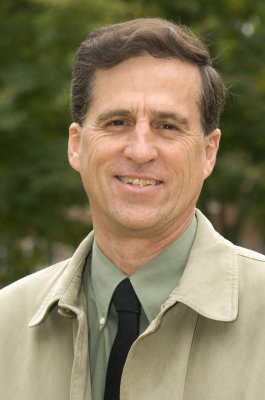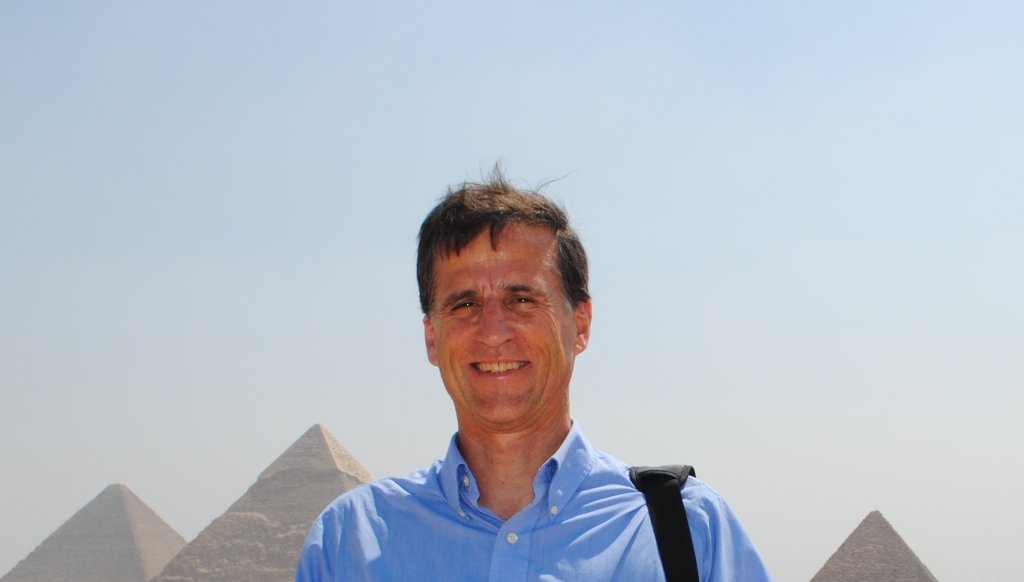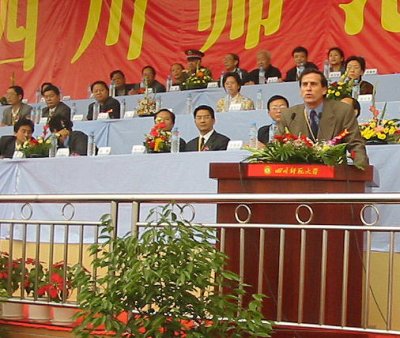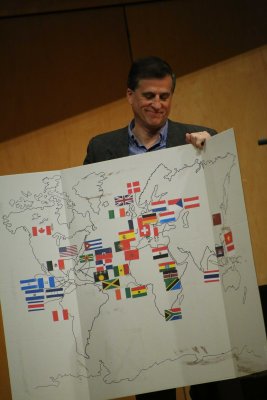Tom Meyers: Taking a Measure of the Miles and Years

Taking a Measure of the Miles and Years
An interview with Tom Meyers, the director of international education and associate academic dean.
By Duane Stoltzfus, professor of communication.
Do you have any idea how many countries you have visited or how many miles you have traveled as the director of international education? Do you track such things?
I track airports and countries. I have a spreadsheet of both. There is this issue of whether you count countries you’ve landed in or countries you’ve spent time in. I’ve been in 55 countries (that includes only landing in some, like United Arab Emirates), 77 cities internationally, and 57 U.S. airports.
What do you do to pass time when you’re traveling, at the airport and on the plane?
I read and sometimes watch movies. I also do Sudoku. On a trip to Ecuador in March, for example, I read Rebel Mother, a book about a Mennonite woman who grew up in Newton, Kansas, and became a revolutionary (Simon & Schuster, 2017). It’s fascinating. She went to Chile first and ended up in Peru. She was totally committed to revolution.
What’s it like to have pre-approved safe passenger status or a frequent flier nice guy rating? Will you lose that perk come July 1?
TSA pre-approval lets you go through and avoid long lines at check in. I have had Sky Priority for years. The real benefit to me is that I rarely check a bag. I will lose that status since I won’t fly nearly as much.
Tell us about your suitcase. You spend a lot of time together. What kind of suitcase do you use?
I have a Samsonite. The most important feature of a suitcase is that it be on good rollers. My little black Samonsite fits in overhead compartments and rolls well. Size and ability to roll are the two priorities.
Do you have a packing list or keep certain things in the suitcase at all times for efficient travel?

I have a list in my head: passport, electronic converter, travel-size toiletries. I’ve packed so many times it’s not a big deal.
Without choosing favorites, which countries have you especially enjoyed visiting and why?
That’s such a hard question. Countries all have interesting things and I enjoy certain things about country x and other things about country y. I have a strong affinity for Africa because of my relationships with people. It’s the kind of warm friendships and community of people that goes back to Haiti where I went on SST. But I enjoy the beauty of so many places. I have a list somewhere of all the amazing sites I’ve seen: the Great Wall in China, the Pyramids in Egypt, the Serengeti in East Africa, Ha Long Bay in Vietnam, Petra in Jordan. The list goes on.
Of the challenges you’ve faced on the ground or in the air over the years, are there one or two that stand out as particularly memorable?

I have many. Traveling in China has always been a challenge. I’ve made the mistake of traveling during the Chinese New Year. I remember pushing and shoving my way to a window to get a bus ticket without speaking speak any Mandarin. Another time my flight in China was delayed. I was sent to a hotel where they wanted to charge me even though the airline had sent me there because of the flight delay.
How are you different now than when you started as international ed director? As a traveler? As a person?
As a person, my life been incredibly enriched by relationships with people around world. I couldn’t have imagined that I would enjoy relationships with so many people who have taught me so much about culture and history. I’ve also learned to let go. I think I’m more relaxed now when I travel.
You think?
I think I am. I know that if I miss a flight or if I get someplace and face a challenge that there’s a way out. If I’m in a taxi in China and the driver tells me he knows where the hotel is and 10 minutes later he says “Do I turn left or turn right?” it will work out.
What have you found especially satisfying about your work?
Saying that SST transforms students has become a cliche, but I’ve seen it happen over and over again. Seeing students whose worlds have expanded, to hear them talk years later about how SST has changed their lives — that is very satisfying.
Is there a student or two who comes to mind?
I can tell you about a number whose vocations have changed, have taken a 90-degree turn after SST. “I thought I would be a medical doctor and now I know I will work with climate change.” “I thought I would be a biochemist and now I know I want to go into law.” There are so many stories like that.

Now that you’re retiring from Goshen College, what will you miss?
I was in the classroom for 20 years. I thoroughly enjoyed teaching. There’s something about the intellectual exchange with students, when eyes light up, when students have that aha moment. People know me now as director of international education but I spent more of my life in the classroom. Occasionally I run into students. Bob Toews told me he was in my first class, 35 years ago.
Now that you don’t have to fly for Goshen College, where do you plan to travel — and why?
The immediate next trip is to France. I don’t have specific plans. People told me not to make specific plans, to allow the next chapter so unfold. I don’t know what I’ll do, but I can’t imagine sitting around.
Anything else?
As a young person I stocked shelves in a grocery store, drove a delivery truck, worked in a factory. In all those jobs there were days when I didn’t want to go to work; the drudgery and routine didn’t appeal to me. In my 36 years at Goshen College there have been very few days when I didn’t want to come to work. I genuinely enjoyed working here. That’s a gift, to be given a job that was interesting and continued to pull me back to work every day.
The interview was condensed and edited.




